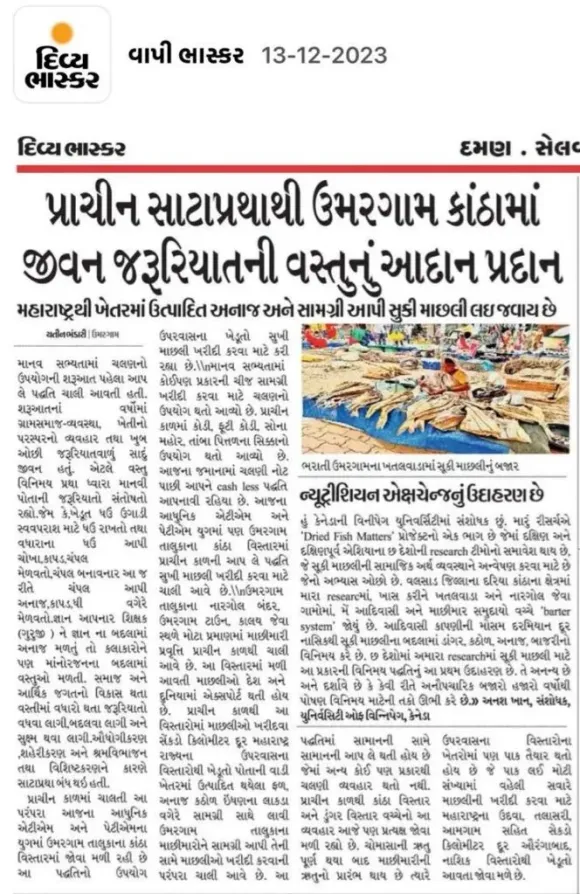We are pleased to share that Dried Fish Matters research was featured in Divya Bhaskar, one of Gujarat’s most widely read newspapers. The article, published in the Vapi edition on December 13, 2023, highlights the enduring barter system between fishing communities and Adivasi farmers in Umargam taluka of Valsad district in Gujarat, India – an area where dried fish is not only a source of nutrition but also a cornerstone of cultural and economic exchange.
The story authored by Yatin Bhandari from Divya Bhaskar draws on fieldwork and observations contributed by Mohammad Anas Khan (DFM Researcher, University of Winnipeg). This piece brings much-needed public attention to practices that often remain invisible in mainstream discussions of food systems and rural livelihoods. It also highlights the potential for mapping the social economy of dried fish value chains, where economic relationships are closely interwoven with social and cultural practices.
Below is an English summary and adapted translation of the article:
The ancient custom of exchanging necessities of life at Umargam coast
Author: Yatin Bhandari
Before the use of currency in human civilization, the barter system was in practice. In the early years, life was simple, centered around village society, mutual agricultural transactions, and very few needs. Therefore, people continued to satisfy their requirements through the barter system. For example, a farmer would grow wheat, keep some for his own consumption, and trade the surplus to obtain rice, cloth, slippers, and other necessities. A shoemaker in the village would give away slippers and receive grains, cloth, and other goods in return. Teachers who imparted knowledge were compensated with grains instead of money, while artists and performers also received goods in exchange for their work.
As society and the economy developed, and the population increased, people’s needs began to grow, change, and become more complex. Due to industrialization, urbanization, and the division of labour, the barter system gradually came to a halt. This system, which was practiced in ancient times, is still seen today in the coastal area of Umargam taluka, even in the era of Paytm and digital cash. The barter system continues to be practiced here by Adivasis who come from hinterland regions to buy dried fish.
Throughout human civilization, currency has been used to purchase all kinds of goods. In ancient times, kodi, phuti kodi, gold stamps, copper coins, and brass coins were in circulation. In today’s era, currency notes are increasingly being replaced by digital cashless systems. Yet, even in this modern age of ATMs and Paytm, the ancient barter system remains alive in the coastal areas of Umargam taluka in Valsad district.
An example of a nutritional exchange
“I am a researcher at the University of Winnipeg, Canada. My research is part of the Dried Fish Matters project, which involves research teams from six countries in South and Southeast Asia exploring the understudied socio-economics of dried fish. In my research in the coastal region of Valsad district, particularly in villages like Khatalwada and Nargol, I have observed a barter system between Adivasi and fishing communities. Adivasi communities exchange paddy, pulses, cereals, and millets brought from faraway areas during the harvest season in return for dried fish. This is the first example of such a unique barter system for dried fish documented in our research across all six countries. It is unique and shows how informal markets have been creating opportunities for nutritional exchange for thousands of years.”
— Anas Khan, Researcher, University of Winnipeg, Canada
Fishing activities have been taking place in locations such as the Nargol landing centre, Umargam, and Kalai in Umargam taluka since ancient times. The fish caught in this area are traded within the country and also exported around the world. Since ancient times, farmers from the hilly regions of Maharashtra state, located hundreds of kilometers away, have been bringing fruits, grains, pulses, fuelwood, and other produce from their fields to exchange with the fishing communities on the Umargam coast for dried fish. In this system, goods are exchanged for goods, with no other form of currency involved.
This transaction between the coastal communities and the Adivasi communities from the hilly regions has continued directly from ancient times to the present day. When the fishing season begins after the monsoon ends, crops are also being harvested in the upland fields, and large numbers of farmers can be seen arriving early in the morning from Aurangabad, Nashik, and other areas of Maharashtra including Udwa, Tamsa, and Amgam hundreds of kilometers away, to exchange their produce for dried fish.

